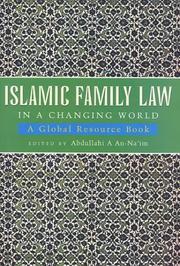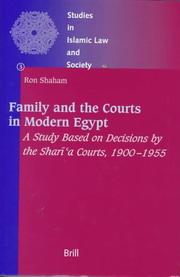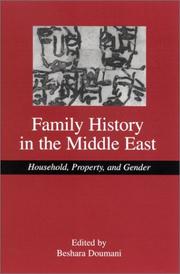| Listing 1 - 10 of 27 | << page >> |
Sort by
|

ISBN: 1842770926 1842770934 Year: 2002 Publisher: London Zed
Abstract | Keywords | Export | Availability | Bookmark
 Loading...
Loading...Choose an application
- Reference Manager
- EndNote
- RefWorks (Direct export to RefWorks)
Book
ISBN: 9054600209 Year: 1999 Publisher: Amsterdam Bulaaq
Abstract | Keywords | Export | Availability | Bookmark
 Loading...
Loading...Choose an application
- Reference Manager
- EndNote
- RefWorks (Direct export to RefWorks)
Personen- en familierecht ; Marokko --- Moe amelaat --- Islam ; geloofsleer --- Domestic relations (Islamic law) --- -341.9:347.6 --- 347.6 <64> --- Aḥwāl al-shakhṣīyah (Islamic law) --- Islamic law --- 341.9:347.6
Book
ISBN: 0815651554 9780815651550 0815631731 9780815631736 Year: 2008 Publisher: Syracuse, N.Y. Syracuse University Press
Abstract | Keywords | Export | Availability | Bookmark
 Loading...
Loading...Choose an application
- Reference Manager
- EndNote
- RefWorks (Direct export to RefWorks)
Book
ISBN: 110719525X 1281903698 9786611903695 0511841310 0511437773 0511436319 0511438443 0511435525 0511437099 9780511438448 0521830443 9780521830447 0521537479 9780521537476 9780511437779 9780511841316 9780511435522 9780511436314 6611903690 0511434847 Year: 2008 Publisher: Cambridge, UK New York Cambridge University Press
Abstract | Keywords | Export | Availability | Bookmark
 Loading...
Loading...Choose an application
- Reference Manager
- EndNote
- RefWorks (Direct export to RefWorks)
In what ways has Islamic law discriminated against women and privileged men? What rights and power have been accorded to Muslim women, and how have they used the legal system to enhance their social and economic position? In an analysis of Islamic law through the prism of gender, Judith Tucker tackles these complex questions relating to the position of women in Islamic society, and to the ways in which the legal system impacted on the family, property rights, space and sexuality, from classical and medieval times to the present. Working with concepts drawn from feminist legal theory and by using particular cases to illustrate her arguments, the author systematically addresses questions of discrimination and expectation - what did men expect of their womenfolk - and of how the language of the law contributed to that discrimination, infecting the system and all those who participated in it.
Women (Islamic law) --- Married women (Islamic law) --- Divorce (Islamic law) --- Domestic relations (Islamic law) --- Aḥwāl al-shakhṣīyah (Islamic law) --- Islamic law --- Married women --- Women --- Legal status, laws, etc. (Islamic law) --- Arts and Humanities --- History

ISSN: 13841130 ISBN: 9004107428 9789004107427 Year: 1997 Volume: 3 Publisher: Leiden Brill
Abstract | Keywords | Export | Availability | Bookmark
 Loading...
Loading...Choose an application
- Reference Manager
- EndNote
- RefWorks (Direct export to RefWorks)
Domestic relations --- Domestic relations (Islamic law) --- History --- -Domestic relations --- Families --- Family law --- Marriage --- Persons (Law) --- Sex and law --- Aḥwāl al-shakhṣīyah (Islamic law) --- Islamic law --- Law and legislation --- -History --- Domestic relations - Egypt - History --- Domestic relations (Islamic law) - Egypt
Book
ISBN: 9781848857421 184885742X Year: 2012 Publisher: London Tauris
Abstract | Keywords | Export | Availability | Bookmark
 Loading...
Loading...Choose an application
- Reference Manager
- EndNote
- RefWorks (Direct export to RefWorks)
Domestic relations (Islamic law) --- Muslim women --- Divorce --- Islamic courts --- Religious aspects --- Islam --- 297.15 --- Marriage --- Broken homes --- Divorced people --- Islamic women --- Women, Muslim --- Women --- Courts, Islamic --- Courts (Islamic law) --- Muslim courts --- Sharia courts --- Courts --- Islamic law --- Aḥwāl al-shakhṣīyah (Islamic law) --- 297.15 Islam: ethiek; religieuze wetten --- Islam: ethiek; religieuze wetten --- Religious aspects&delete& --- Divorce - Religious aspects - Islam --- Muslimahs

ISBN: 0791487075 1417523980 9781417523986 079145679X 9780791456798 0791456803 9780791456804 9780791487075 Year: 2003 Publisher: Albany, N.Y. State University of New York Press
Abstract | Keywords | Export | Availability | Bookmark
 Loading...
Loading...Choose an application
- Reference Manager
- EndNote
- RefWorks (Direct export to RefWorks)
Challenges conventional assumptions about the family and the modern Middle East.
Domestic relations (Islamic law) --- Families --- Aḥwāl al-shakhṣīyah (Islamic law) --- Islamic law --- Family --- Family life --- Family relationships --- Family structure --- Relationships, Family --- Structure, Family --- Social institutions --- Birth order --- Domestic relations --- Home --- Households --- Kinship --- Marriage --- Matriarchy --- Parenthood --- Patriarchy --- History. --- Social aspects --- Social conditions --- Middle East --- Social conditions. --- Familles --- History --- Histoire --- Droit islamique --- Moyen-Orient --- Conditions sociales --- History of Asia --- anno 1800-1999
Book
ISBN: 0857722816 0755607686 9780857722812 9781306069564 1306069564 1780765622 9781780765624 9780755607686 9780857734242 0857734245 Year: 2013 Publisher: London ; New York : I.B. Tauris,
Abstract | Keywords | Export | Availability | Bookmark
 Loading...
Loading...Choose an application
- Reference Manager
- EndNote
- RefWorks (Direct export to RefWorks)
"Much of the life and ritual of the Druze in Lebanon appears mysterious to outsiders, as this esoteric sect remains closed to non-members. Lubna Tarabey, herself a member of this community, is ideally placed to offer insight into the family life, tradition and religious practices of the Druze. She looks back to the 1970s, and the start of a civil war that shattered Lebanon along confessional lines, to explore how the substantial social and political changes that have shaken the country have affected marriage and divorce practices. Family Law in Lebanon highlights the social ramficiations of this civil war, as Lebanese society divided according to sectarian affiliations, strengthening this facet of identity to the detriment of a wider 'Lebanese' identification. It was through this process that the internal cohesion and solidarity of a group such as the Druze became even more important. Thus, for generations, the Druze way of life was characterized by a high degree of 'traditional' practices and customs. Examining the development of attitudes towards marriage and divorce uncovers the extent to which these traditions are being developed, negotiated and even cast aside. Through analysis of court records, Tarabey explores established and emerging patterns of marriage choices and grounds for divorce. She thus focuses on two interconnected trajectories: one that considers the changes in these overall family patterns and another that places these changes within the legal context in which they occur, focussing on the interplay between the social and the legal. It is through this that she highlights a complex web of change and continuity, of traditional values competing with enhanced individualism and personal freedoms."--Bloomsbury publishing.
Divorce. --- Domestic relations. --- Domestic relations --- Families --- Family law --- Marriage --- Persons (Law) --- Sex and law --- Broken homes --- Divorced people --- Law and legislation --- Domestic relations (Islamic law) --- Druzes --- Family law. --- Legal status, laws, etc. --- Marriage customs and rites --- Darazis --- Druse --- Druses --- Druz --- Druze --- Druzim --- Durūz --- Islamic sects --- Aḥwāl al-shakhṣīyah (Islamic law) --- Islamic law
Book
ISBN: 1108363474 1108365035 0511989601 0521766605 0521133270 Year: 2017 Publisher: Cambridge : Cambridge University Press,
Abstract | Keywords | Export | Availability | Bookmark
 Loading...
Loading...Choose an application
- Reference Manager
- EndNote
- RefWorks (Direct export to RefWorks)
In writings about Islam, women and modernity in the Middle East, family and religion are frequently invoked but rarely historicized. Based on a wide range of local sources spanning two centuries (1660-1860), Beshara B. Doumani argues that there is no such thing as the Muslim or Arab family type that is so central to Orientalist, nationalist, and Islamist narratives. Rather, one finds dramatic regional differences, even within the same cultural zone, in the ways that family was understood, organized, and reproduced. In his comparative examination of the property devolution strategies and gender regimes in the context of local political economies, Doumani offers a groundbreaking examination of the stories and priorities of ordinary people and how they shaped the making of the modern Middle East.
Domestic relations (Islamic law) --- Aḥwāl al-shakhṣīyah (Islamic law) --- Islamic law --- Middle East --- Social conditions. --- Families --- History. --- Family --- Family life --- Family relationships --- Family structure --- Relationships, Family --- Structure, Family --- Social institutions --- Birth order --- Domestic relations --- Home --- Households --- Kinship --- Marriage --- Matriarchy --- Parenthood --- Patriarchy --- Social aspects --- Social conditions
Book
ISBN: 9774167759 1617977837 1617977845 9781617977831 9781617977848 9789774167751 Year: 2017 Publisher: Cairo New York
Abstract | Keywords | Export | Availability | Bookmark
 Loading...
Loading...Choose an application
- Reference Manager
- EndNote
- RefWorks (Direct export to RefWorks)
Legal Reform and Gender Justice examines the interplay between legal reform and gender norms and practices. It examines the processes of advocating for, and contesting the khul' and new family courts laws, shedding light on the agendas and strategies of the various actors involved. It also examines the ways in which women and men have made use of these legal reforms; how judges and other court personnel have interpreted and implemented them; and how the reforms may have impacted women and men's understandings, expectations, and strategies when navigating marriage and spousal roles.
Women --- Domestic relations (Islamic law) --- Domestic relations --- Women's rights --- Legal status, laws, etc. --- Rights of women --- Human rights --- Aḥwāl al-shakhṣīyah (Islamic law) --- Islamic law --- Human females --- Wimmin --- Woman --- Womon --- Womyn --- Females --- Human beings --- Femininity --- Civil rights --- Law and legislation
| Listing 1 - 10 of 27 | << page >> |
Sort by
|

 Search
Search Feedback
Feedback About UniCat
About UniCat  Help
Help News
News